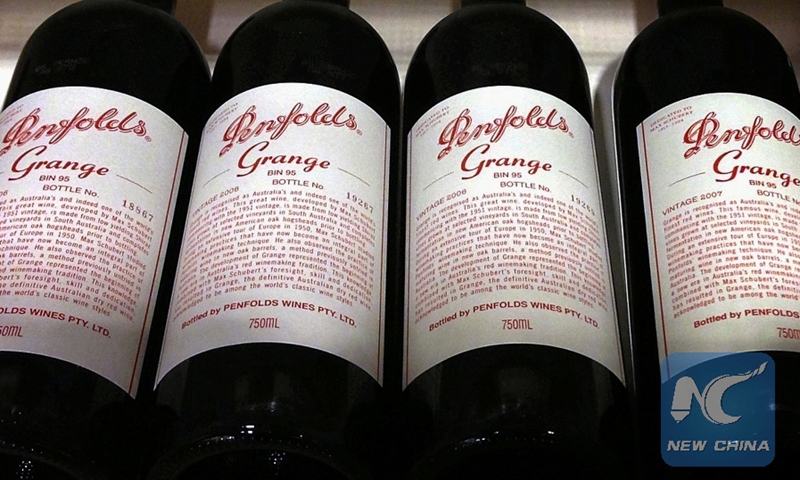China’s anti-dumping duties devastating to Australian wine brewers
By GT staff reporters Source: Global Times Published: 2020/11/30 11:37:14

Bottles of Penfolds Grange, made by Australian wine maker Penfolds and owned by Australia's Treasury Wine Estates, sit on a shelf for sale at a wine shop in central Sydney, Australia, August 4, 2014. (Xinhua/REUTERS)
Australian vineyards are beginning to feel the pinch of anti-dumping moves taken by China, and some plan to sell their grapes to other countries to make up for loss of the nation's biggest wine export market, insiders told the Global Times on Monday.
Chen Wei, an importer of Australian wine, told the Global Times that his suppliers, including four based in the state of South Australia, are trying to sell grapes instead of wine to New Zealand, the US and Europe, at a much thinner margin, given the grim prospect of losing the Chinese market.
Chen said he is already in talks with alternative suppliers in Spain, Italy and Chile after anti-dumping duties were imposed. His last batch of Australian wine arrived in China in March, and some of the most popular brands will be out of stock as early as next February.
"One of my suppliers said around 60 percent of its products are usually sold to China," Chen said. "The impact of the anti-dumping tariffs is devastating to them."
Last Friday, China's Ministry of Commerce (MOFCOM) imposed provisional anti-dumping measures in the form of deposits on wine imported from Australia, ranging from 107.1 to 212.1 percent that are expected to remain in effect until August 2021.
China is Australia's top wine export market. Despite the COVID-19 pandemic, China imported A$3 billion ($2.2 billion) worth of Australian wine in the first three quarters of the year, up 4 percent year-on-year. In the first half of the year, Australian wine exports to China were up 0.7 percent year-on-year, and they accounted for 37 percent of total wine imports in China, far exceeding other major wine producers such as France, Chile and Italy.
Another industry insider who prefers to be anonymous told the Global Times many Australian vineyards are controlled by Chinese sales and importing companies, and they cater only to the Chinese market. Some of the companies are trying to increase local sales, but most are hoarding their products in Australia in the hope that the anti-dumping measures will be removed soon.
"Most importers believe that they will continue to feel the impact of the anti-dumping measures for the next three to five years," the person said, "and for importing companies that don't have any wineries or other long-term investment, they are opting out of the Australian market en masse."
Mainstream brands with large annual output will be hardest hit, the insider said, especially lower- to middle-tier brands.
On Monday, Australian wine brand Treasury Wine said it would divest Penfolds, one of its best-known labels, as part of an emergency plan to seek new markets after China's anti-dumping duties.
The brand's shares dropped 12 percent on Monday, after plunging 11 percent on Friday, triggered by the announcement of the preliminary ruling by the MOFCOM.
Treasury Wine's shares have dropped a staggering 43 percent so far this year, under the negative influence of a souring relationship between China and Australia.
Posted in: MARKETS